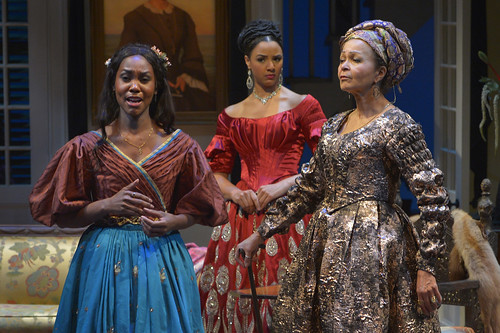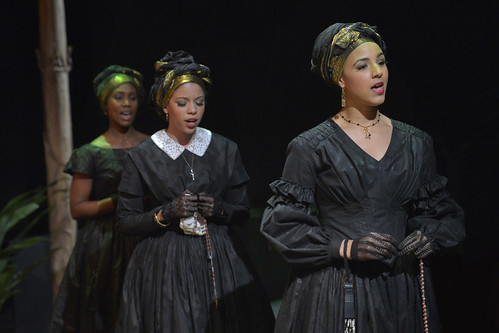Gardley's House stands best when it sings
EXTENDED THROUGH MARCH 23! The cast of Berkeley Repertory Theatre's world premiere of The House that will not Stand by Marcus Gardley includes (from left) Joniece Abbott-Pratt as Odette, Tiffany Rachelle Stewart as Agnès and Lizan Mitchell as Beartrice. Below: Stewart (front), Flor De Liz Perez (center) and Abbott-Pratt play sisters in a multi-racial family in 19th-century New Orleans. Photos by kevinberne.com
The cast of Berkeley Repertory Theatre's world premiere of The House that will not Stand by Marcus Gardley includes (from left) Joniece Abbott-Pratt as Odette, Tiffany Rachelle Stewart as Agnès and Lizan Mitchell as Beartrice. Below: Stewart (front), Flor De Liz Perez (center) and Abbott-Pratt play sisters in a multi-racial family in 19th-century New Orleans. Photos by kevinberne.com
Music is so ingrained in New Orleans culture that it's no surprise when a play set in the area turns out to be full of wonderful choral singing, voodoo chanting and other musical surprises. But what's interesting about Marcus Gardley's The House that will not Stand, now receiving its world premiere at Berkeley Repertory Theatre, is that music elevates the show in ways the plot and characters do not.
This play about a mixed-race family in New Orleans circa 1836 really wants to be a musical.
As we've seen in other plays by Oakland native Gardley (including the superior ...and Jesus Moonwalks the Mississippi), the writing is strong, poetic and suffused with a powerful beauty. In other words, his writing fairly sings.
There's already a heightened sense of reality in this House, what with ghosts and conjurings and deadly whispers, but the play is most alive when there's music. When three grieving women come home from church – daughters of a white business owner and his African-American mistress – they enter singing a gorgeous prayer for their very recently deceased father. It's a stunningly beautiful introduction to these young women, just as the Act 2 opening involving the house slave, Makeda (the glorious Harriett D. Foy), singing while she makes a gumbo, is a high point of the entire show. In fact, Foy's Makeda is the musical heart of this production. She's actually in a musical. It just may take a while for everybody else to catch up.
Gardley's story, set in the waning days of plaçage, a cultural system in which free women of color (many mixed race) were essentially sold or "placed" by their families into marriage with a white man who would likely also have a white wife and family. Set 18 years after the Louisiana Purchase, when the heathen Americans are ruining everything about New Orleans, including plaçage, House focuses on the house of Lazare (Ray Reinhardt), a fur trader who lives with his black mistress of many years, Beartrice (Lizan Mitchell), and their three daughters: Agnès (Tiffany Rachelle Stewart), Maude Lynn (Flor De Liz Perez) and Odette (Joniece Abbott-Pratt). Lazare's corpse is laid out in the drawing room, and there's some suggestion that he was killed by Beartrice on the day of the ball in which her daughters, especially Agnès, might be "placed."
Family squabbles between mother and daughters and between sisters bump up against an old rivalry between Beartrice and La Veuve (Petronia Paley). Paley also plays Beartrice's sister, Marie Josephine, who has been locked in the house for years. Presiding over all of this is Makeda, who is hoping that her master's death will mean her freedom at long last.
Now that's a lot of drama to cram into two hours and 25 minutes. You might even say it was drama at an operatic level, and it is. Director Patricia McGregor establishes a tone that easily wavers from comic to tragic to pulpy melodrama (you've seen "Dallas" and "Dynasty" – now see "New Orleans"!). When the music comes in (sound design and original music by Keith Townsend Obadike) or when there's some stirring choreography by Paloma McGregor, it's not at all jarring. And as I've already said, I wish there were more of both.
The performances balance ferocity and grace in equal measure, but Foy really steals the show as Makeda. She's smart, feisty and loving – a real member of the family, but one who is not there of her own free will. Her urge toward freedom is where the drama's truest emotion lies, and it's not by accident that Foy does much of the show's singing and performs it with vitality and a stirring depth passion. (Foy is also responsible for the vocal arrangements and some of the original compositions.)
There's an opera/musical in here to be sure, but not on this set. Antje Ellermann's split-level antebellum mansion construction is pretty, but it crowds the action and doesn't give the actors much room to move. This set (and this story) seem more suited to the spaciousness of the Roda Theatre, not the confines of the Thrust Stage.
There's a fascinating story here populated with powerful, compelling women. The story also illuminates an aspect of American history that we don't know enough about, but this House is still building a frame that will let these voices not only stand but soar.
[bonus interview]I talked to playwright Marcus Gardley for a feature in the San Francisco Chronicle. Read the story here.
FOR MORE INFORMATIONMarcus Gardley's The House that will not Stand continues an extended run through March 23 on Berkeley Repertory Theatre's Thrust Stage, 2025 Addison St., Berkeley. Tickets are $29-$59. CAll 510-647-2949 or visit www.berkeleyrep.org.
